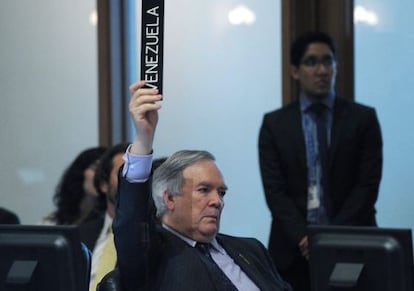Permanent Council of the OAS silences Venezuelan opposition
Member states agree to make the session featuring Representative Corina Machado private


Venezuela has dominated the meetings at the Organization of American States this Friday over the countries that favor ALBA and the indispensable Caribbean states. Venezuela found a way to silence opposition leader and Representative María Corina Machado by voting to bar the press from hearing her speech before the Permanent Council. With this maneuver, the Venezuelan government tried to delegitimize the opposition against the government of President Nicolás Maduro before the regional institution and prevent the meeting from turning into a platform to denounce Chavismo.
“With this motion they have shown that they are afraid to let the true magnitude of the Venezuelan repression be known,” Machado told the press during a break in the day’s meetings. “But, as they muffle any voice that differs from the regime they are confessing to what is happening in my country.” The representative, who has become the new moral leader of the opposition since the imprisonment of Leopoldo López, took the opportunity to denounce the degradation of democracy in Venezuela - a topic she had prepared to discuss before the OAS and that will only be heard by the representatives of the member states because the session is now private and closed to press.
They have shown they are afraid to let the world see the true magnitude of the repression in Venezuela"
María Corina Machado
Machado has not only had the opportunity to deliver “the people’s version” in public and in private before the organization but, as she herself said, she was able to bring international attention to a vision of the muddled reality in Venezuela right now. A gesture that, for the representative, has more significance than mobilizing OAS members who have already shown their indifference to the dissidents. Machado urged Latin American governments to “take up the collective commitment to defend democracy” and she pressed the organization to invoke the Democratic Charter, demand the liberation of political prisoners and send a delegation of observers to her country - articles which the OAS did not include in the declaration on the Venezuelan crisis it adopted 15 days ago.
Machado insisted on the “the irreversibility of the civic and peaceful citizen movement” and pleaded for a “democratic transition” through different mechanisms that would use the Venezuelan constitution as a “revocatory referendum or a National Constituent Assembly.” The representative reminded members that she faced an uncertain future when she returned to her native land given that the Venezuelan government had informed her on Friday morning that her parliamentary immunity had been revoked. “I don’t know what my destiny holds but I do know my duty is to keep up the movement,” she said. “It cannot go back.”
The gag Venezuela put on the representative is just another in a long list of disappointments from the OAS in terms of its response to a crisis that has already caused 30 deaths. It is proof of the power Caracas exerts within the organization. “We are watching what is happening at the OAS with concern and we call for adherence to its democratic principles,” said Carlos Vargas, leader of the student movement that set off the protests. “It is cutting down its integrity for Venezuelan money,” he added. Vargas is also a member of the committee founded by the mother of Geraldine Morales - one of the first victims of the marches - and Iván Freites, the veteran union leader who joined Machado in Washington.
After silencing Machado, Venezuela seeks new strategies to blot out the impact of her speech.
When Machado spoke to the press, the avalanche of votes from Venezuela had not only silenced the representative publicly but, to dissipate the impact of her speech even more, they managed to block the first point on the agenda of the day, which was meant to be the discussion on the crisis in Venezuela. And, they got Panama to cede the floor to Machado, credentialed as an alternative representative for that country. That first opportunity having been sidelined, the representative had to wait after the final session of questions to deliver her speech.
Translation: Dyane Jean François
Tu suscripción se está usando en otro dispositivo
¿Quieres añadir otro usuario a tu suscripción?
Si continúas leyendo en este dispositivo, no se podrá leer en el otro.
FlechaTu suscripción se está usando en otro dispositivo y solo puedes acceder a EL PAÍS desde un dispositivo a la vez.
Si quieres compartir tu cuenta, cambia tu suscripción a la modalidad Premium, así podrás añadir otro usuario. Cada uno accederá con su propia cuenta de email, lo que os permitirá personalizar vuestra experiencia en EL PAÍS.
En el caso de no saber quién está usando tu cuenta, te recomendamos cambiar tu contraseña aquí.
Si decides continuar compartiendo tu cuenta, este mensaje se mostrará en tu dispositivo y en el de la otra persona que está usando tu cuenta de forma indefinida, afectando a tu experiencia de lectura. Puedes consultar aquí los términos y condiciones de la suscripción digital.








































